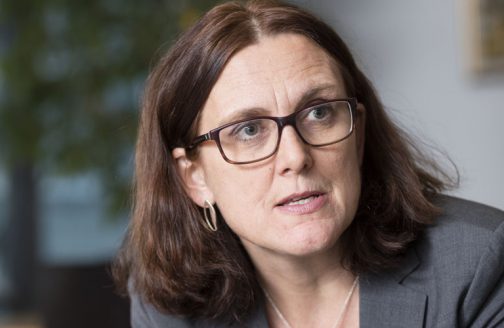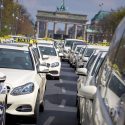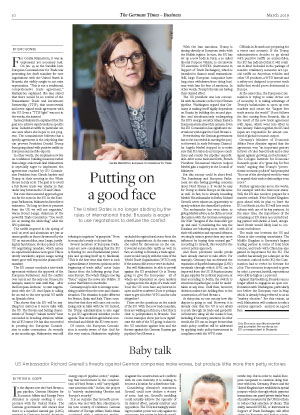The United States is no longer abiding by the rules of international trade. Brussels is eager to use negotiations to defuse the conflict

For Cecilia Malmström, it was an unpleasant yet necessary task.
On Jan. 19, as the Swedish-born European Commissioner for Trade was presenting her draft mandate for new negotiations with the United States in Brussels, she visibly sought to not raise expectations. “This is not a traditional, comprehensive trade agreement,” Malmström explained. She also stated that there would be no revival of the Transatlantic Trade and Investment Partnership (TTIP), that controversial and never-signed trade agreement with the US. Even a “TTIP light” was not in the works, she insisted.
Instead, Malmström explained that the goal is to achieve rapid results in specific areas. Industrial tariffs in particular are one area where she hopes to see progress. The commissioner believes that a speedy agreement is the only thing that can prevent President Donald Trump from going ahead with punitive tariffs on European automobile exports.
In other words, the emphasis now lies on confidence-building measures rather than a large-scale trade deal. Malmström is especially eager to implement the agreements reached by EU Commission President Jean-Claude Juncker and Trump at their meeting in the White House in July 2018. The goal is to avoid a full-blown trade war similar to that under way between the US and China.
But even this measured approach goes too far for some in the EU. In the European Parliament, Malmström faces fierce resistance. “As long as there is pressure from the US, we will not negotiate,” warns Bernd Lange, chairman of the powerful Trade Committee. “You won’t see us waving the white flag,” adds the SPD politician.
The tariffs imposed in the spring of 2018 on steel and aluminum are just as unacceptable as those threatened by the US on automobiles, says Lange, justifying his hard stance. He also points to the US negotiating mandate, which names an equal trade balance as its goal. This is utterly unrealistic, argues Lange, noting that it goes well beyond the planned EU mandate.
The EU cannot conclude a new trade agreement without the approval of the European Parliament. And the conflict over cars is not the only one. France, for example, wants to wait until May – after the European elections – to start negotiations with the US. And Spain is calling for an end to the new special US tariffs on Spanish olives.
This shows that the EU will be anything but united as it enters talks with the US. The threats and baiting characteristic of Trump’s “salami tactics” have succeeded in breeding divisions within the 28 EU states. He has also succeeded in pressing the European Commission to make concessions. As recently as six months ago, Malmström was still refusing to negotiate “at gunpoint.” Now, it seems she’s ready to do just that.
Several members of European Parliament are now complaining that the EU is flouting its own fundamental principles and opening itself up to blackmail. “This is the first time that there is such a great distance between opinions at the beginning of trade talks,” notes Luisa Santos from the lobbying group Business Europe. The whole thing is one big “farce,” argues the news site Politico. It seems that failure is inevitable.
Germany may be able to leverage something positive from the new and chaotic situation. The situation is quite different for France, Spain and Italy. These countries fear that they will come out on the losing side in talks with the US. Indeed, the Trump administration is also eager to put EU agricultural subsidies on the agenda. That would hit agricultural countries hard and divide the EU even more.
Of course, the European Commission is acutely aware of this. And for this very reason, Malmström explicitly excluded the agricultural sector from the planned negotiations. At the same time, she called for discussions on the controversial automobile tariffs as well. In fact, according to Brussels, a trade agreement would comply with the rules of the World Trade Organization (WTO) only if the automobile sector were included.
But will Malmström be able to prevail against the US president? Or is Trump going to give the Europeans – all of whom are dependent on open markets – a glimpse into the abyss of a trade war? Does the US even have any interest in open and free markets? Does it perhaps want to get rid of the WTO and its rules altogether?
These are the questions on the minds of the EU. With the new trade mandate, they are walking on thin ice, a fact that is clear to policymakers in Brussels. Two recent examples show just how significant the risk of the US going it alone is: the US sanctions against Iran and the threats against the German-Russian gas pipeline Nord Stream 2.
With the Iran sanctions, Trump is aiming directly at European trade with the Mullah regime. In turn, the EU has set up a new body in Paris, a so-called Special Purpose Vehicle, to circumvent US sanctions: INSTEX (Instrument in Support of Trade Exchanges), which is intended to finance small transactions. Still, large European companies have long since withdrawn from doing business with Iran for fear of sanctions. In other words, Trump’s threats are having their desired effect.
The US president was less successful with his attacks on the Nord Stream pipeline. Washington argued that Germany is making itself highly dependent on Russia by building the second pipeline and simultaneously endangering the EU’s energy security. Many Eastern European states share this opinion. Even the EU Commission has significant reservations with regard to Nord Stream 2.
Nevertheless, the German government has so far succeeded in moving the project forward. In early February, Chancellor Angela Merkel stepped in to make sure that EU states do not impose conditions and render the pipeline unprofitable. After some back-and-forth, French President Emmanuel Macron helped Merkel gain a majority in the Council of Ministers.
But this success could be short-lived. The Bundestag and European Parliament are also having growing concerns about Nord Stream 2. It would be easy for Trump to divide Europe on this issue as well. In fact, he is already hounding Merkel. His ambassador in Berlin, Richard Grenell, never misses an opportunity to openly criticize the chancellor’s policies. The ambassador has even taken to giving Merkel advice, as he did in a recent discussion with the German newspaper Die Welt: “Imagine if the chancellor got up and said, ‘Considering the way the Russians are behaving now, with all of their evil activities and repeated offenses, we simply cannot grant them any more influence by buying their natural gas.’” According to Grenell, this would be the correct policy approach.
And these persistent needle pricks have already started to take effect. For example, Germany has accelerated the expansion of liquefied natural gas (LNG) terminals through which LNG can be imported from the US. If Russia misuses its gas supplies for political purposes, at least according to Berlin, the switch to American liquefied gas could be undertaken at any time. Until then, however, decision makers are holding firm to the construction of Nord Stream 2.
At this point, no one can say how this dispute is going to end. However, it is already clear that the US is not afraid to push through its trade and geopolitical interests using all the means it has, including, if necessary, sanctions. In other words, the EU can no longer be sure that trade policy conflicts will be addressed by applying trade policy instruments in compliance with the WTO rules.
Officials in Brussels are preparing for a worst-case scenario. If the Trump administration decides to go ahead with punitive tariffs on automobiles, the EU has indicated that it will retaliate in kind. Included in the package of massive retaliatory measures are special tariffs on American vehicles and other US products, a WTO lawsuit and a safety net designed to prevent trade shifts that would prove detrimental to Europe.
At the same time, the European Commission is trying to make virtue out of necessity. It is taking advantage of Trump’s isolationism to open up new markets and create the “largest free trade area in the world.” If one follows the line coming from Brussels, this is the result of the new trade agreement with Japan, which went into effect in late January. Taken together, the EU and Japan are responsible for almost one-third of global economic output.
Germany’s Minister of Economic Affairs Peter Altmaier argued that the agreement was “an important gesture in favor of rules-based trade and a clear signal against growing protectionism.” The Cologne Institute for Economic Research spoke of a “great day for free trade,” arguing that Trump’s “protectionist economic policies” had prompted “the rest of the developed world to want to expand their trade relationships even more.”
Further agreements are in the works, for example with the Mercosur states. Still, the EU also needs to prepare for a massive setback. If the United Kingdom goes ahead with its plan to leave the EU on March 29, the EU will lose trade volume with one of its key partners. At the same time, the importance of the remaining 27 EU states as a united trading partner will shrink. A hard, unregulated Brexit would likely lead to economic turbulence.
The trade war between the US and China is also creating uncertainty. The Middle Kingdom is Germany’s largest trading partner in terms of total trade volume, and trade with China has also gained in importance for the EU. The conflict has already put a damper on the economic outlook in the EU; the Commission had to revise its forecast for 2019. The eurozone is expected to grow by only 1.3 percent; last fall, expectations were still as high as 1.9 percent.
Against this backdrop, Brussels can no longer afford to engage in an open confrontation with Washington, particularly not before the European vote in May, which is already being referred to as an “anxiety election.” For this reason, as well, Malmström will continue to take a cautious approach – and put on a good face.
Eric Bonse
is a political scientist and journalist. He works as an EU correspondent in Brussels.



